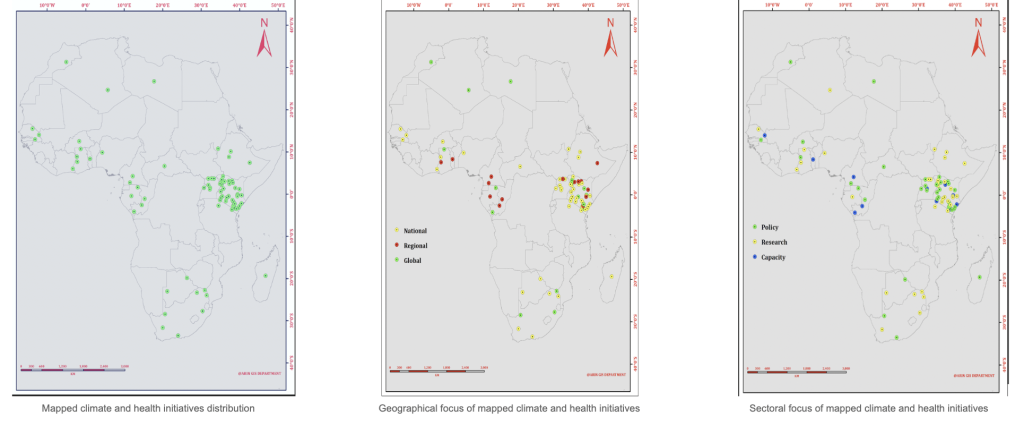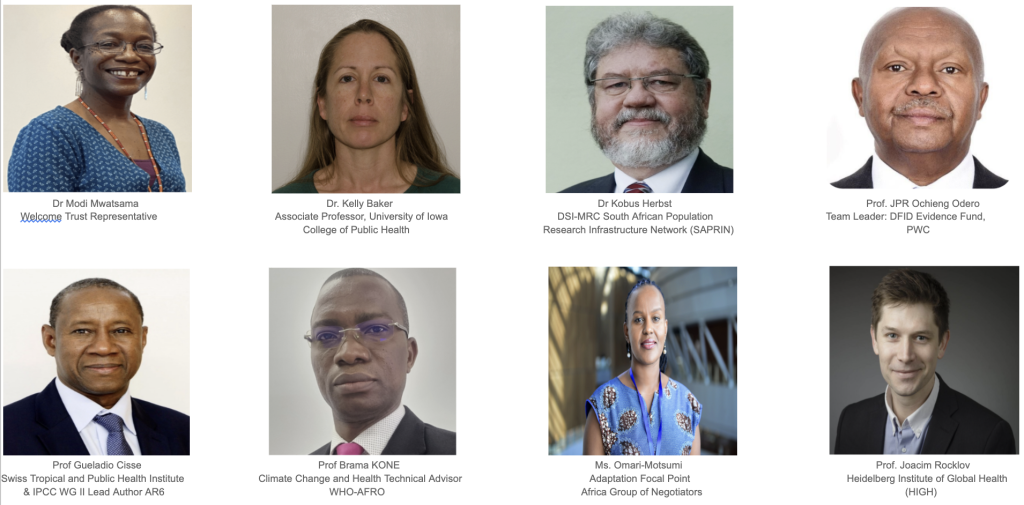Background
Climate change is a global crisis with far-reaching implications for public health, and Africa stands out as a region particularly vulnerable to the adverse effects of extreme weather events linked to climate variability. This heightened susceptibility is exacerbated by an already strained healthcare system and the absence of robust early warning systems, factors partly attributed to the region’s fragile socio-economic conditions. Despite being a region that is most susceptible to the health effects of climate change and variability, many African countries have failed to effectively adapt to climate change impacts due to lack of context-specific data to inform action. Advancing the climate and health agenda in Africa will, therefore, depend on how well the linkages between research, policy, and society are strengthened in addition to tackling existing inequalities in research. While research evidence has been identified to be key in furthering sustainable development in policy documents like the 2030 United Nations Agenda and the 2063 African Union Agenda, data generated from the Global North may fail to effectively foster the much-needed transformative change in Africa. Though data from the Global North may help inform researchers, policymakers, and communities on how to address C & H issues, they may not be context-relevant, and thus the need to support and augment the capacity of African researchers to enable them to produce context-specific data for action.
At the moment, African countries appear to have national climate change policy and national adaptation plan documents that only alludes to C & H in barely a sentence. Regional adaptation plans for different countries, therefore, have to be co-developed to facilitate policy interventions. Besides, limited funding and inadequate capacity of C & H actors is also another impediment to the advancement of the climate and health agenda in Africa. The noticeable absence of climate change and health courses or fellowships offered within the various African regions further makes it difficult for interested stakeholders to access such courses and enhance their capacity. This inadequacy acts as an obstacle to the effective design and implementation of research and adaptation programs. Compounding the matter is the fact that climate change and health research are often compartmentalized across various disciplines, resulting in a fragmented landscape of specialized discussions. This compartmentalization hinders efforts to synthesize key findings aimed at identifying trends and gaps in the evidence.
Urgent action is imperative if economies are to be decarbonized and more resilient health systems developed. This can be accomplished by providing contextualized evidence to support action, leading in climate advocacy and leadership, guiding sectors that significantly affect health through their actions, and assuming responsibility for climate resilience and the imperative to decarbonize healthcare systems. Transdisciplinary research and action agenda on climate change and health can help inform evidence given the human-environmental system problems being currently experienced by society. Considering the importance of collaboration in advancing the C & H agenda, key role players have to be identified and the process has to be intentional to guarantee that regional adaptation plans can be developed for different countries.
Rationale: Why A C & H Platform
The transformation needed to address the health impacts of climate change in Africa will demand innovative approaches of mobilizing resources, working jointly, and applying knowledge. To efficiently address the diverse C & H challenges as well as the varied needs and interests of actors in the different sectors, research must be effectively interlinked with policymaking, planning, and action. The co-generation of data across disciplines is one approach that can foster such transformations. By providing timely and policy-relevant research, researchers can support evidence-based decision-making and effective implementation of climate and health policies. This can be achieved by creating platforms and networks that bring together researchers, policy-makers, and practitioners from various disciplines and sectors. Such platforms facilitate knowledge exchange, sharing of best practices, and collaboration on research and policy development. The platforms can also be used to encourage regular communication channels such as meetings, conferences, and webinars to help foster dialogue and information sharing between different stakeholders. This ensures that C & H stakeholders are up-to-date with the latest research, policy updates, and field experiences. Information on the connection between climate and health will equally be provided on the platform as most people view them separately. This can be done by sharing evidence of how climate change can affect the health sector, and similarly how the health sector can get prepared and minimize the negative effects of climate change.
Vision Statement
Building a transdisciplinary community of practice towards enhanced decision support environment on C & H research and policy in Africa
Mission Statement
Nurturing transdisciplinary science-policy engagements towards advocating for resilient and low-carbon health systems.
AFRICA CLIMATE AND HEALTH STAKEHOLDER DISTRIBUTION DATABASE
The Climate and Health Stakeholder Distribution Database for Africa, a key outcome of the Consultation on Communities of Practice for Transdisciplinary Research and Action in Climate Change and Health in Africa project, funded by Wellcome. This comprehensive database maps out a diverse network of stakeholders engaged in climate and health initiatives across the continent. It serves as a vital resource for fostering collaboration, enhancing research impact, and advancing innovative solutions to climate-related health challenges in Africa. We hope it will be a valuable tool for researchers, practitioners, and policymakers working towards resilient and sustainable health systems.
CLIMATE AND HEALTH DISTRIBUTION REPORT IN AFRICA

CAPCHA ACTIVITIES
- Research and Innovation
Africa is among the regions that is most affected by climate change; experiencing more frequent and severe extreme weather events, such as droughts, floods, and heat waves. These events exacerbate health issues by increasing the incidence of water-borne and vector-borne diseases, malnutrition, and respiratory problems. Many African countries have fragile health systems that struggle to cope with the additional burden of climate-related health impacts. Improved data collection and sharing are thus key for understanding the health impacts of climate change and facilitates the development effective interventions. CAPCHA will strive to centralize data from various sectors as well as promote joint research for informed decision-making.
- Policy and Advocacy
CAPCHA will serve as a unified platform to advocate for policies addressing the health impacts of climate change. It will create avenues to influence national and international climate policies, ensuring they incorporate health considerations and support the specific needs of African countries. The platform will also align health strategies with broader climate resilience efforts.
Additionally, CAPCHA will provide opportunities for participation in international climate negotiations, advocating for Africa’s health priorities and ensuring that global climate actions account for the continent’s unique vulnerabilities.
- Capacity Enhancement
Raising awareness about the health risks of climate change and engaging communities in adaptation and mitigation efforts are vital. CAPCHA will support educational campaigns and community-based initiatives while empowering local populations to take action. Integration of health in climate change courses in school curriculum will also be advocated for to guarantee that those who graduate from universities have the needed capacity to tackle transdisciplinary research in C &H. This will be done through:
· Summer schools
· Bootcamps
· Webinars
· Seminars/Workshops
· Short self-paced courses
ADVISORY GROUP 
COMPONENTS OF CAPCHA
- Consultative Platform on Climate and Health in Africa(CAPCHA) concept note – For more information
- Africa Climate and Health Stake holder distribution database
- Climate and Health Advisory Members Profiles – For more information
